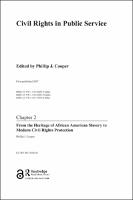Chapter 2 From the Heritage of African American Slavery to Modern Civil Rights Protection
Proposal review
| dc.contributor.author | Cooper, Phillip J. | |
| dc.date.accessioned | 2020-08-20T13:58:40Z | |
| dc.date.available | 2020-08-20T13:58:40Z | |
| dc.date.issued | 2016 | |
| dc.identifier.uri | https://library.oapen.org/handle/20.500.12657/41365 | |
| dc.description.abstract | Promises of justice and equality made in the U.S. Constitution, numerous Amendments, and decisions of the Supreme Court are hallmarks of American civil rights. Yet the realities of inequality remain facts of modern life for too many Native Americans, African Americans, and Latino Americans, even though state-mandated racial segregation has been outlawed for years. Women still face a variety of forms of discrimination—some subtle and others more overt. There remain many laws that treat people differently because of sexual orientation. People with disabilities are supposed to be protected by a variety of statutes, but many of these policies remain unfulfilled promises. These are just some of the many challenges of civil rights that persist in a nation that proudly points to the words above the entrance to the U.S. Supreme Court that read "Equal Justice Under Law." This text is for current and future public service professionals —whether they are in government agencies, in nonprofit organizations that provide social services for government, or contractors who operate as state actors—who increasingly serve diverse communities with a range of complex challenges, while working and managing within organizations that, fortunately, are themselves more diverse than ever before. For those who work and serve in such settings, civil rights is not an abstract academic study, but a critically important and very practical fact of daily life. This book may also be used on civil rights law, policy, and public administration courses, and each chapter ends with a section on ‘Issues for Policy and Practice’ to guide an examination of key public policy hurdles in the fight for civil rights as well as the implications for public service practice. Through an engaging exploration of edited court cases, legislation, and speeches, the reader is encouraged to think critically about civil rights law and policy pertaining to African Americans, Native Americans, Latinos/Latinas, gender, sexual orientation, and disabilities, to learn what civil rights require, but also to come to a more empathetic understanding of how different groups of people experience civil rights and the unique challenges they face. | |
| dc.language | English | |
| dc.subject.other | amendment | |
| dc.subject.other | clause | |
| dc.subject.other | due | |
| dc.subject.other | equal | |
| dc.subject.other | fourteenth | |
| dc.subject.other | law | |
| dc.subject.other | process | |
| dc.subject.other | protection | |
| dc.subject.other | states | |
| dc.subject.other | united | |
| dc.title | Chapter 2 From the Heritage of African American Slavery to Modern Civil Rights Protection | |
| dc.type | chapter | |
| oapen.identifier.doi | 10.4324/9781315719566 | |
| oapen.relation.isPublishedBy | 7b3c7b10-5b1e-40b3-860e-c6dd5197f0bb | |
| oapen.relation.isPartOfBook | 75d08579-e692-49c7-b108-cce11e6ebfe3 | |
| oapen.relation.isbn | 9781138856523 | |
| peerreview.anonymity | Single-anonymised | |
| peerreview.id | bc80075c-96cc-4740-a9f3-a234bc2598f1 | |
| peerreview.open.review | No | |
| peerreview.publish.responsibility | Publisher | |
| peerreview.review.stage | Pre-publication | |
| peerreview.review.type | Proposal | |
| peerreview.reviewer.type | Internal editor | |
| peerreview.reviewer.type | External peer reviewer | |
| peerreview.title | Proposal review | |
| oapen.review.comments | Taylor & Francis open access titles are reviewed as a minimum at proposal stage by at least two external peer reviewers and an internal editor (additional reviews may be sought and additional content reviewed as required). |

